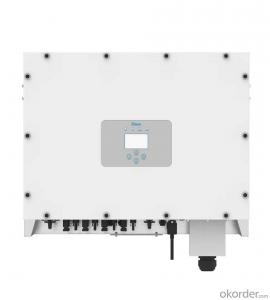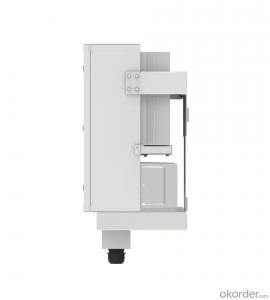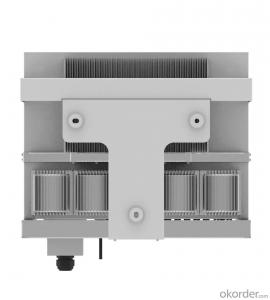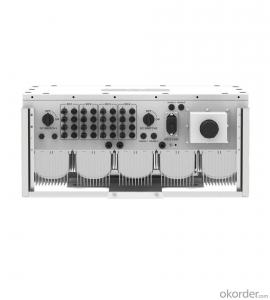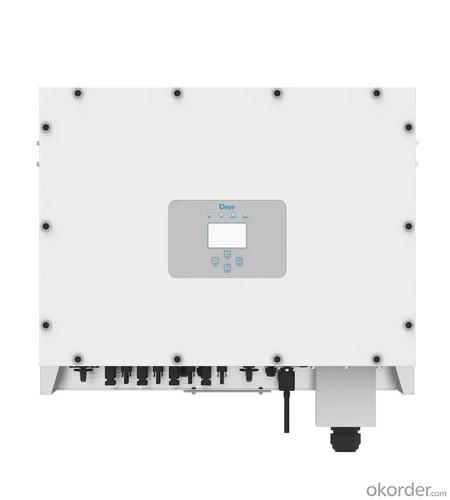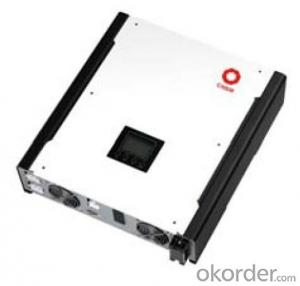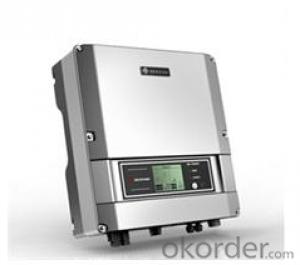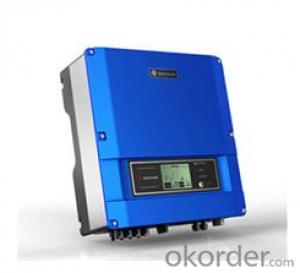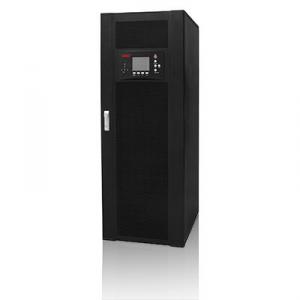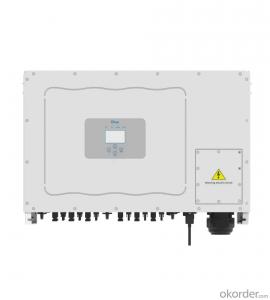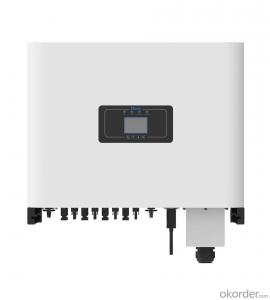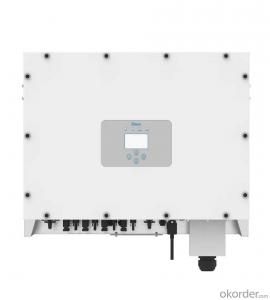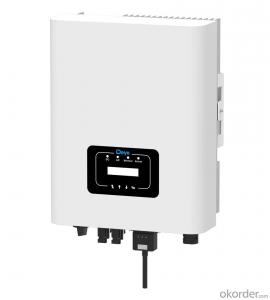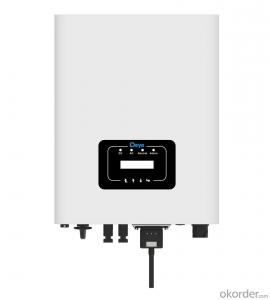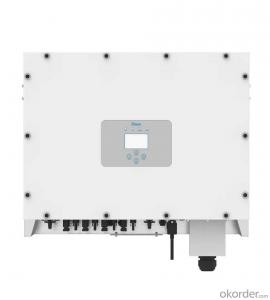SPS Solar Inverter - Sun-60/70/75/80k-G | 60-80kW | Three Phase | 4 MPPT
- Loading Port:
- Ningbo
- Payment Terms:
- TT OR LC
- Min Order Qty:
- 100 pc
- Supply Capability:
- 5000 pc/month
OKorder Service Pledge
OKorder Financial Service
You Might Also Like
Specification
| Model | SUN-60K-G | SUN-70K-G | SUN-75K-G | SUN-80K-G | ||
| Input Side | ||||||
| Max. DC Input Power (kW) | 78 | 91 | 97.5 | 104 | ||
| Max. DC Input Voltage (V) | 1000 | |||||
| Start-up DC Input Voltage (V) | 250 | |||||
| MPPT Operating Range (V) | 200~850 | |||||
| Max. DC Input Current (A) | 40+40+40+40 | |||||
| Max. Short Circuit Current (A) | 60+60+60+60 | |||||
| Number of MPPT / Strings per MPPT | 4/3 | 4/4 | 4/4 | 4/4 | ||
| Output Side | ||||||
| Rated Output Power (kW) | 60 | 70 | 75 | 80 | ||
| Max. Active Power (kW) | 66 | 77 | 82.5 | 88 | ||
| Nominal Output Voltage / Range (V) | 3L/N/PE 380V/0.85Un-1.1Un, 400V/0.85Un-1.1Un | |||||
| Rated Grid Frequency (Hz) | 50 / 60 (Optional) | |||||
| Operating Phase | Three phase | |||||
| Rated AC Grid Output Current (A) | 87 | 101.5 | 108.7 | 115.9 | ||
| Max. AC Output Current (A) | 95.7 | 111.6 | 119.6 | 127.5 | ||
| Output Power Factor | ||||||
| Grid Current THD | <3%< td=""> | |||||
| DC Injection Current (mA) | <0.5%< td=""> | |||||
| Grid Frequency Range | 47~52 or 57~62 (Optional) | |||||
| Efficiency | ||||||
| Max. Efficiency | 98.7% | |||||
| Euro Efficiency | 98.3% | |||||
| MPPT Efficiency | >99% | |||||
| Protection | ||||||
| DC Reverse-Polarity Protection | Yes | |||||
| AC Short Circuit Protection | Yes | |||||
| AC Output Overcurrent Protection | Yes | |||||
| Output Overvoltage Protection | Yes | |||||
| Insulation Resistance Protection | Yes | |||||
| Ground Fault Monitoring | Yes | |||||
| Anti-islanding Protection | Yes | |||||
| Temperature Protection | Yes | |||||
| Integrated DC Switch | Yes | |||||
| Remote software upload | Yes | |||||
| Remote change of operating parameters | Yes | |||||
| Surge protection | DC Type II / AC Type II | |||||
| General Data | ||||||
| Size (mm) | 700W×575H×297D | |||||
| Weight (kg) | 60 | |||||
| Topology | Transformerless | |||||
| Internal Consumption | <1W (Night) | |||||
| Running Temperature | -25~65℃, >45℃ derating | |||||
| Ingress Protection | IP65 | |||||
| Noise Emission (Typical) | <55 dB | |||||
| Cooling Concept | Smart cooling | |||||
| Max. Operating Altitude Without Derating | 2000m | |||||
| Warranty | 5 years | |||||
| Grid Connection Standard | CEI 0-21, VDE-AR-N 4105, NRS 097, IEC 62116, IEC 61727, G99, G98, VDE 0126-1-1, RD 1699, C10-11 | |||||
| Operating Surroundings Humidity | 0-100% | |||||
| Safety EMC / Standard | IEC/EN 61000-6-1/2/3/4, IEC/EN 62109-1, IEC/EN 62109-2 | |||||
| Features | ||||||
| DC Connection | MC-4 mateable | |||||
| AC Connection | IP65 rated plug | |||||
| Display | LCD 240 × 160 | |||||
| Interface | RS485/RS232/Wifi/LAN | |||||
The Deye 60-80K grid-connected inverter is suited for medium and large-scale commercial rooftops and ground-mounted solar PV system in which reliability and stability are important. the full series inverter has 30% DC input oversizing ratio and 10% AC output overloading ratio, offering a faster return on investment.
4 MPP tracker, Max. efficiency up to 98.7%
Zero export application, VSG application
String intelligent monitoring (optional)
Wide output voltage range
Type II DC/AC SPD
Anti-PID function (Optional)
- Q: Can a solar inverter be used with batteries for energy storage?
- Yes, a solar inverter can be used with batteries for energy storage. In fact, this is a common practice in solar power systems, where excess energy generated by the solar panels is stored in batteries for later use when the sun is not shining. The solar inverter plays a crucial role in converting DC power from the batteries into usable AC power for electrical appliances.
- Q: Can a solar inverter be used with different monitoring platforms?
- Yes, a solar inverter can be used with different monitoring platforms as long as it is compatible with the protocols and communication standards supported by those platforms.
- Q: Can a solar inverter be used in conjunction with a power optimizer?
- Yes, a solar inverter can be used in conjunction with a power optimizer. Power optimizers are devices that are typically installed at each solar panel to maximize energy production and improve overall system performance. They can work together with a solar inverter to enhance the efficiency of the solar power system by individually optimizing the power output of each panel.
- Q: What is the role of an MPPT (Maximum Power Point Tracking) inverter?
- The role of an MPPT (Maximum Power Point Tracking) inverter is to optimize the conversion of solar energy into usable electricity. It constantly tracks and adjusts the operating point of the solar panels to ensure that they are always operating at their maximum power point, which maximizes the efficiency and output of the solar system.
- Q: Can a solar inverter be used in regions with high levels of dust or debris?
- Yes, solar inverters can be used in regions with high levels of dust or debris. However, it is important to regularly clean and maintain the solar panels and inverters to ensure optimal performance and prevent any potential damage caused by the accumulation of dust or debris.
- Q: What are the safety features of a solar inverter?
- The safety features of a solar inverter typically include surge protection, overvoltage protection, short circuit protection, ground fault detection, and overtemperature protection. These features help to prevent damage to the inverter and the electrical system, ensuring safe and reliable operation.
- Q: What is the maximum AC output current that a solar inverter can provide?
- The maximum AC output current that a solar inverter can provide depends on the specific model and capacity of the inverter. In general, it is determined by factors such as the maximum power rating and efficiency of the inverter, as well as the size and configuration of the solar photovoltaic (PV) system it is connected to.
- Q: What is the maximum efficiency rating of a solar inverter?
- The maximum efficiency rating of a solar inverter can vary depending on the model and manufacturer, but typically it ranges from 95% to 98%.
- Q: How does a solar inverter affect the value of a property?
- A solar inverter can positively affect the value of a property by making it more attractive to potential buyers. It increases the property's energy efficiency and reduces electricity costs, which can be a significant factor for buyers looking for sustainable and cost-effective homes. Additionally, having a solar inverter installed demonstrates the property's commitment to renewable energy, which can be appealing to environmentally-conscious buyers.
- Q: How does a solar inverter provide ground fault protection?
- A solar inverter provides ground fault protection by continuously monitoring the flow of electricity between the solar panels and the electrical grid. If it detects any abnormal or excessive current leakage to the ground, it quickly shuts off the flow of electricity to prevent electrical hazards, such as electric shocks or electrical fires.
Send your message to us
SPS Solar Inverter - Sun-60/70/75/80k-G | 60-80kW | Three Phase | 4 MPPT
- Loading Port:
- Ningbo
- Payment Terms:
- TT OR LC
- Min Order Qty:
- 100 pc
- Supply Capability:
- 5000 pc/month
OKorder Service Pledge
OKorder Financial Service
Similar products
Hot products
Hot Searches
Related keywords
